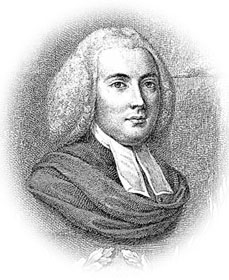| Jonathan Mayhew  Born: 8-Oct-1720 Born: 8-Oct-1720
Birthplace: Martha's Vineyard, MA
Died: 9-Jul-1766
Location of death: Boston, MA
Cause of death: unspecified
Gender: Male
Religion: Congregationalist
Race or Ethnicity: White
Occupation: Religion Nationality: United States
Executive summary: Congregationalist minister, anti-Royalist American clergyman, born at Martha's Vineyard on the 8th of October 1720, being fifth in descent from Thomas Mayhew (1592-1682), an early settler and the grantee (1641) of Martha's Vineyard. Thomas Mayhew (circa 1616-1657), the younger, his son John (died 1689) and John's son, Experience (1673-1758), were active missionaries among the Indians of Martha's Vineyard and the vicinity. Jonathan, the son of Experience, graduated at Harvard in 1744. So liberal were his theological views that when he was to be ordained minister of the West Church in Boston in 1747 only two ministers attended the first council called for the ordination, and it was necessary to summon a second council. Mayhew's preaching made his church practically the first Unitarian Congregational church in New England, though it was never officially Unitarian. In 1763 he published Observations on the Charter and Conduct of the Society for Propagating the Gospel in Foreign Parts, an attack on the policy of the society in sending missionaries to New England contrary to its original purpose of "Maintaining Ministers of the Gospel in places wholly destitute and unprovided with means for the maintenance of ministers and for the public worship of God"; the Observations marked him as a leader among those in New England who feared, as Mayhew said (1762), "that there is a scheme forming for sending a bishop into this part of the country, and that our Governor, a true churchman, is deeply in the plot." To an American reply to the Observations, entitled A Candid Examination (1763), Mayhew wrote a Defense; and after the publication of an Answer, anonymously published in London in 1764 and written by Thotnas Secker, Archbishop of Canterbury, he wrote a Second Defense. He bitterly opposed the Stamp Act, and urged the necessity of colonial union (or communion) to secure colonial liberties. He died on the 9th of July 1766. Mayhew was Dudleian lecturer at Harvard in 1765, and in 1749 had received the degree of D.D. from the University of Aberdeen. Father: Experience Mayhew
University: Harvard University (1744)
Author of books:
Discourse Concerning Unlimited Submission and Non-Resistance to the Higher Powers (1750)
Observations on the Charter and Conduct of the Society for Propagating the Gospel in Foreign Parts (1763)
Do you know something we don't?
Submit a correction or make a comment about this profile
Copyright ©2019 Soylent Communications
|